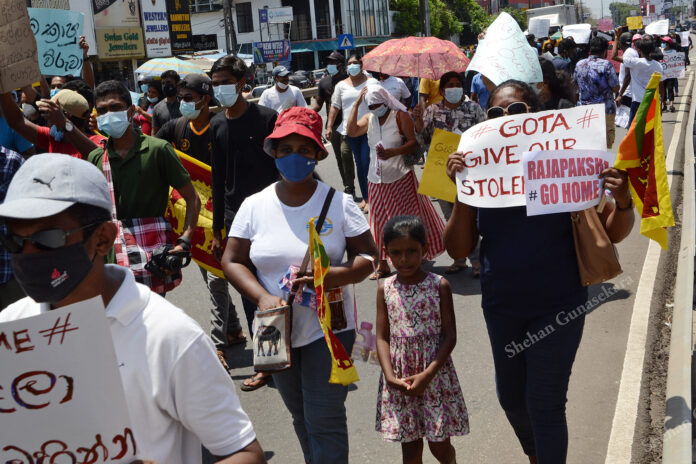Statement of the organizations of Sri Lankans living abroad.
The slogan “Go, Gota Go!” which the people of Sri Lanka, the vast majority of whom constitute the youth and the politically unattached, have rallied around means much more than asking President Gotabhaya Rajapakse to resign. The people are fed up with the Rajapakse family and do not want any Rajapakse to be in any position of power. The people also do not want an authoritarian rule, whether under a Rajapakse or any other. They also want to get back to their lives, which had been denied due to utter mismanagement by the Rajapakses. The people also want freedom, the freedom to air their views and criticize those in positions of power. The people of Sri Lanka have spoken loudly and clearly.
While reiterating our support for the just demands of our fellow Sri Lankans, we as organisations representing the Sri Lankans living abroad make the following concrete proposals:
- It is imperative that the aspirations of the people who have come out onto the streets demanding change are met. A mechanism to ensure this through continuous dialogue must be established as a matter of urgency. The victory that is being achieved must not be allowed to be lost. We need to learn from the successes, failures, and disappointments of the various movements for democracy across the world.
- The Twentieth Amendment to the Constitution shall be immediately abolished, and provisions of the Nineteenth Amendment brought back, putting rights its inherent contradictions. We propose that the Twenty-First Amendment Bill should provide for the restoration of the Nineteenth Amendment, and the abolition of the executive presidency resulting in the election of the President by Parliament, and the President acting on the advice of the Prime Minister. We are conscious of the need to avoid a costly referendum at this point. There are different views on whether a referendum is needed to require the President to act on the advice of the Prime Minister and for him/her to be elected by Parliament, all the same, there is a growing body of legal opinion that such changes do not require a referendum. It is best that the matter is determined by the Supreme Court. Any provisions that the Supreme Court determines as requiring a referendum could be suitably amended, and a referendum avoided at this point.
- We propose that President Gotabhaya Rajapaksa should immediately declare in Parliament his willingness to resign from the position of President and tender his resignation upon the Twenty-first Amendment taking effect, while during the interim period act in consultation with leaders of political parties represented in Parliament.
- Until the next Parliamentary General Election, the number of Ministers should not exceed twenty, and the total number of non-Cabinet Ministers and Deputy Ministers should not exceed twenty, irrespective of which party or parties constitute the Government.
- The Twenty-first Amendment should provide for a Parliamentary General Election soon after it is enacted.
- All Constitutional Commissions should stand dissolved with the enactment of the Twenty-First Amendment, and new appointments made through a newly established Constitutional Council.
- The Government and the Opposition should endeavour to work together in consultation with the people, with a view to overcoming the present economic crisis until a Parliamentary General Election is held, and all political parties and citizens’ organizations should appeal to the international community to come to Sri Lanka’s aid at this critical juncture. The Government should keep Parliament and the general public regularly informed of steps taken to overcome the crisis in the spirit of a participatory democracy, and in a transparent and accountable manner.
- For the long-term peace, prosperity and economic stability, Sri Lanka needs a new Constitution made with the direct participation of all its peoples. The new Constitution should also address the ethnic issue, the issues of inequality, and accountable governance and contain a fundamental rights chapter that accords with modern international human rights standards. We, therefore, propose that the Twenty-first Amendment should also provide for the adoption of a new Constitution through a directly elected Constitutional Convention. The ongoing constitutional reform process in Chile offers us a valuable example of how it could be done.
Signed:
Dr Lionel Bopage
On behalf of
Voice for Democracy in Sri Lanka International Collective (VDSL)
Voice for Justice in Sri Lanka Inc. (VJSL), Australia
Australian Advocacy for Good Governance in Sri Lanka Inc. (AAGGSL), Australia
Collective for Progressive Unity International Collective (CPU), and
International Network for Sri Lanka’s Democracy e.V (INSD), Germany
